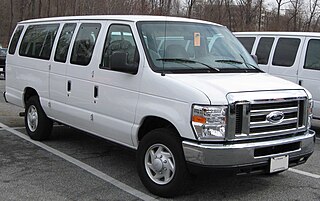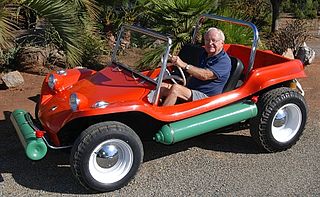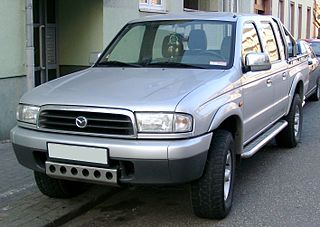Galion Godwin Truck Body Co. was named after its founding city of Galion, Ohio and was founded as early as the 1870s. Originally known as Galion Buggy Company, the business was born from demand for horse-drawn transportation. A short time after its founding, Galion Buggy Company found a market for retrofitting hauling boxes onto existing buggies. [1] Galion soon exited the competitive buggy manufacturing market for the more lucrative aftermarket hauling beds and dump boxes. Around 1910, Galion Buggy Company changed its name to Galion Allsteel Body Company as horse-drawn buggies were gradually being replaced by motor vehicles.
The company is often cited as an originator of the pickup truck and an early developer of the dump truck. [1] As early as 1913 Galion Allsteel was installing hauling boxes on slightly modified Ford model T chassis. The popularity of this combination led to the first production pickup truck by Ford in 1925. [2] Though Ford's production model T pickup virtually eliminated the need for Galion's aftermarket boxes, Ford formed a partnership with Galion for other aftermarket equipment. Throughout the 1930s Galion Allsteel and Wood Manufacturing Co. were the only two companies who supplied Ford Motor Company with all dump beds and garbage containers for their model AA and BB chassis. [1] [2]
Galion Allsteel continued manufacturing a variety of aftermarket truck equipment throughout the 20th century. In 1950, Galion negotiated a marketing deal with All American Toy Co. who began production of "Rocky" the toy dump truck, which prominently displayed Galion logos on its sides. [3] In 1976 Galion Allsteel was purchased by Peabody International Corporation and the name was changed to Peabody Galion. [4] Galion remained under the ownership of Peabody and was sold to McClain Industries Inc. in 1992. The company flourished for the first few years of McClain ownership, but the company began to experience financial troubles by the late 1990s. In 2003 McClain Industries sold Galion's name and assets to competitor Godwin Manufacturing Company who now operates under the corporate umbrella of The Godwin Group. [5] [6] McClain Galion became Galion-Godwin Truck Body Company LLC., as it is known today.

A pickup truck or pickup is a light or medium duty truck that has an enclosed cabin, and a back end made up of a cargo bed that is enclosed by three low walls with no roof. In Australia and New Zealand, both pickups and coupé utilities are called utes, short for utility vehicle. In South Africa, people of all language groups use the term bakkie; a diminutive of Afrikaans: bak, meaning bowl or container.

Louis Marx and Company was an American toy manufacturer in business from 1919 to 1980. They made many types of toys including tin toys, toy soldiers, toy guns, action figures, dolls, toy cars and model trains. Some of their notable toys are Rock'em Sock'em Robots, Big Wheel tricycles, Disney branded dollhouses and playsets based on TV shows like Gunsmoke. Its products were often imprinted with the slogan "One of the many Marx toys, have you all of them?"

The Ford E-Series is a range of full-size vans manufactured and marketed by the Ford Motor Company. Introduced for 1961 as the replacement of the Ford F-Series panel van, four generations of the model line have been produced. Marketed for both cargo and passenger transport configurations, the E-Series has been designed with multiple design variations for both retail and commercial sale, including vans, and commercial-grade cutaway van chassis and stripped chassis.

The Ford F-Series is a series of light-duty trucks marketed and manufactured by Ford Motor Company since the 1948 model year. The Ford-Series is marketed as a range of full-sized pickup trucks positioned above the midsize Ranger but below the larger Super Duty in the Ford truck lineup. Alongside the Ford-150, the Ford-Series also includes the Super Duty series, which includes the heavier-duty Ford-250 through Ford-450 pickups, Ford-450/Ford-550 chassis cabs, and Ford-600/Ford-650/Ford-750 Class 6–8 commercial trucks.

The Ford Excursion is a heavy-duty SUV marketed by Ford Motor Company from 2000 through 2005. At its introduction, the Excursion was the longest and heaviest SUV ever to enter mass production. The third Ford SUV was derived from the F-Series pickup trucks, and the model line used a heavier-duty chassis and frame than the Expedition; both vehicles competed against the Chevrolet Suburban.

The International Harvester Company was an American manufacturer of agricultural and construction equipment, automobiles, commercial trucks, lawn and garden products, household equipment, and more. It was formed from the 1902 merger of McCormick Harvesting Machine Company and Deering Harvester Company and three smaller manufacturers: Milwaukee; Plano; and Warder, Bushnell, and Glessner. Its brands included McCormick, Deering, and later McCormick-Deering, as well as International. Along with the Farmall and Cub Cadet tractors, International was also known for the Scout and Travelall vehicle nameplates. In the 1980s all divisions were sold off except for International Trucks, which changed its parent company name to Navistar International.

Sterling Trucks Corporation was an American truck manufacturer. Founded in 1998, Sterling was created following the 1997 acquisition of the heavy-truck product lines of Ford Motor Company by Freightliner. Taking its nameplate from a long-defunct truck manufacturer, Sterling was slotted between Freightliner and Western Star within the Daimler product range.

A dump truck, known also as a dumping truck, dump trailer, dumper trailer, dump lorry or dumper lorry or a dumper for short, is used for transporting materials for construction as well as coal. A typical dump truck is equipped with an open-box bed, which is hinged at the rear and equipped with hydraulic rams to lift the front, allowing the material in the bed to be deposited ("dumped") on the ground behind the truck at the site of delivery. In the UK, Australia, South Africa and India the term applies to off-road construction plants only and the road vehicle is known as a tip lorry, tipper lorry, tipper truck, tip truck, tip trailer or tipper trailer or simply a tipper.

The Meyers Manx dune buggy is a small recreationally-oriented automobile, designed initially for desert racing by Californian engineer, artist, boat builder and surfer Bruce F. Meyers. It was produced by his Fountain Valley, California company, B. F. Meyers & Co. from 1964 to 1971, in the form of car kits applied to shortened chassis of Volkswagen Beetles. The car line dominated dune racing in its time, breaking records immediately, and was eventually also released in street-oriented models, until the company's demise due to tax problems after Meyers's departure. New vehicles inspired by the original Manx buggy have been produced by Meyers's re-founded operation, Meyers Manx, Inc., since 2000. The name and cat logo of the brand derives from the Manx cat, by virtue of the tailless breed's and the shortened vehicle's truncated "stubbiness".

The Mazda B series is a series of pickup trucks that was manufactured by Mazda. Produced across five generations from 1961 to 2006, the model line began life primarily as a commercial vehicle, slotted above a kei truck in size. Through its production, Mazda used engine displacement to determine model designations; a B1500 was fitted with a 1.5 L engine and a B2600, a 2.6 L engine.

Cutaway van chassis are used by second stage manufacturers for a wide range of completed motor vehicles. Especially popular in the United States, they are usually based upon incomplete vans made by manufacturers such as Chrysler, Ford, and General Motors which are generally equipped with heavier duty components than most of their complete products. To these incomplete vehicles, a second stage manufacturer adds specific equipment and completes the vehicle. Common applications of this type of vehicle design and manufacturing includes small trucks, school buses, recreational vehicles, minibuses, and ambulances. The term "cutaway" can be somewhat of a misnomer in most of the vehicle's context since it refers to truck bodies for heavy-duty commercial-grade applications sharing a common truck chassis.

The Chevrolet Kodiak and GMC TopKick are a range of medium-duty trucks that were produced by the Chevrolet and GMC divisions of General Motors from 1980 to 2009. Introduced as a variant of the medium-duty C/K truck line, three generations were produced. Slotted between the C/K trucks and the GMC Brigadier Class 8 conventional, the Kodiak/TopKick were developed as a basis for vocationally oriented trucks, including cargo haulers, dump trucks, and similar vehicles; on later generations, both cutaway and cowled-chassis variants were produced for bus use.

The Diamond T Company was an American automobile and truck manufacturer. They produced commercial and military trucks.
NAPCO (Northwestern Auto Parts Company) was a four-wheel drive (4x4) vehicle parts manufacturing company founded in 1918 and based in Minneapolis, Minnesota USA. Besides four-wheel drive units, NAPCO also provided winches, auxiliary transmissions, tandem drive axles, hydrovac systems, and dump truck bodies.
The Hubley Manufacturing Company was an American producer of a wide range of cast-iron toys, doorstops, and bookends. Toys, particularly motor vehicles and cap guns, were also produced in zinc alloy and plastic. The company is probably most well known for its detailed scale metal kits of Classic cars in about 1:20 scale. Starting in 1960, Hubley participated for a couple of years with Detroit automakers as a plastic promotional model maker. Many Hubley toys are now sought-after collectibles.

Western Star Trucks Sales, Inc. is an American truck manufacturer headquartered in Portland, Oregon, and a subsidiary of Daimler Truck North America, which is an independent subsidiary of the multinational Daimler Truck. Western Star trucks are commonly sold at Freightliner dealerships.
Product Miniature Company, or known by the acronym PMC, was a company that manufactured pre-assembled plastic promotional models cars, banks and toys in Milwaukee, Wisconsin. It was started by brothers William Edward "Ed" and Paul Ford in 1946. Car model production, the company mainstay, ended about 1965. In 1958 or 1959 the company moved to Pewaukee, west of Milwaukee, and remains there to this day, now producing other plastic promotional products, but not vehicles. Sigmunt "Zigmund" Alexander Suchorski worked as a molding machine operator for Product Miniature in Milwaukee